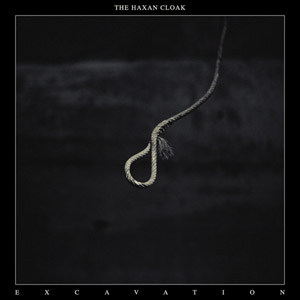The Haxan Cloak Excavation
What are we to make of music that dwells on death? Our culture does its […]

What are we to make of music that dwells on death? Our culture does its best to push the inevitable out of our minds and for most artists, apart from rare exceptions like Coil, odds are that evoking death is a cheap way of importing gravitas, reflecting a cultural neurosis while keeping it at arms’ length. Listeners don’t need any external data to figure out what The Haxan Cloak (a.k.a. Bobby Krilic) is meditating on via his second album, Excavation. From the noose-like loop of rope on the cover to the sharp in-breath of reversed drum hits, which stalk restlessly over the album’s misty wastes, Excavation imagines the afterlife as a kind of spiritual meat grinder. Appearing courtesy of Tri Angle, a label that’s gotten plenty of aesthetic mileage out of the spectral, The Haxan Cloak’s full-bore emptiness feels refreshingly inescapable. As Ben Frost’s By the Throat is to fans of composers like Jóhan Jóhannsson, Excavation is to witch house; it’s unsparing but still palatable, metal-influenced in a thoughtful way, and almost suffocatingly cinematic.
Excavation is as lugubrious and omen-filled as it reads for the first few spins, but after that point, the conceptual sheath partially falls off, revealing that Krilic is sneakier than he lets on. Certainly, long stretches of the album sound like a spirit is being drummed off into the afterlife with mixed results, grasping onto scraps of life—many of those drum hits feel like a heart trying to stir itself back to life, only it’s forgetting the right tempo. There are cello bows jouncing against catgut, serrated digital drones that worm through the bowels, and processed sounds that scream through the periphery like anamorphic memento mori—they’re too warped for their significance to be grasped head-on, yet they leave a foul sense of dread and absence in their wake anyway. What’s revealed after the listener braves the harsh surroundings are sly flashes of structure that don’t have to rise above a whisper to quietly direct all this groundless energy. The Haxan Cloak is actually like Demdike Stare in this non-superficial way; both make music that’s harder to grasp than it seems, as if they’re trying to make out images in a scrying mirror.
Krilic does eventually get to more graspable structures, as a flimmering and tarnished synth unearths itself toward the end of “The Mirroring (Part 2).” The two tracks that follow, “Dieu” and “The Drop,” are more familiar in form—the former’s weeping strings-over-beats formula even sounds somewhat expected—although the affect remains distinctly uncomfortable. As these songs demonstrate, Krilic’s secret talent is creating disconcertment without much visible effort. Excavation treads, for the most part, the line between electro-acoustic experimentation for its own sake and more familiar shapes, although the beats remain too diffuse to put a label on. The LP’s strength is in that undecidedness. When he leans too far to one side, which actually doesn’t happen all that often, the album can feel mournful or facile. Neither too tight nor too loose, 13-minute closer “The Drop” summarizes things nicely. Wandering between overtly pretty and stubbornly ominous, it flirts with clichés on both sides, but wisely checks itself when things start to get a bit drippy.

